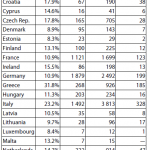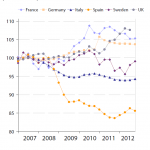Self-employment and entrepreneurship represent an important force for innovation and economic growth. Self-employed people make up more than 15% of workers in the European Union. Although the majority work solely on their own account, almost a third of the self-employed create jobs for others.

Whilst social security systems differ from one Member State to another, in many cases the self-employed are not eligible for the same social protection granted to employees, or their benefits are limited. Extending more social protection to the self-employed can be seen as a question of social justice. However it may also have important effects on innovation and growth.
Better social protection for the self-employed could encourage more of the unemployed to accept the risks of self-employment and start their own businesses. On the other hand, entrepreneurs may not welcome protection from all social risks. Higher taxes or social contributions due to extended social security, as well as increased administrative burdens, could discourage those opportunity-driven entrepreneurs who contribute most to economic growth.
The European Parliament is expected to consider soon a resolution on social protection for the self-employed as well as a long-term entrepreneurship strategy for the EU.










[…] Our keysource on social protection for self-employed workers has the answer. Our briefing on self-employment and social security analyses the effects on innovation and economic […]